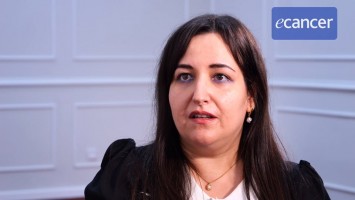We have a huge capacity at WHO through various clusters and groups working on various aspects of cancer. Cancer is quite a special case of a health condition which is determined by many different causes and is then expressing itself as a large variety of single diseases. So we have causes, diseases and we need to have a system in place to fight against cancer. At WHO I’m working in the non-communicable disease cluster where we are very much determining the agenda, the global agenda, to put NCDs on the agenda, to fight against tobacco and risk factors. We have other clusters working with health systems and essential medicines, reproductive health, vaccines; a lot of groups in WHO and I’m trying to catalyse that we all, as WHO, one WHO against cancer, work together no matter where we are in an organisational group. So the model to fight against cancer we try to develop at WHO but not only as a WHO model of new WHO reform, how to work together, but this is something that others can take up in a government to work across various sectors traditionally working not together like vaccines, reproductive health, NCDs. This is where we want to go is to have a health system platform for delivering cancer.
UICC is our official partner and for UK we have an official relationship between WHO and UICC. So we do a lot together on advocacy, we’re working together on these major meetings, the World Cancer Congress, World Cancer Leaders’ Summit we have organised together where we see both bringing together in a complementary way our key stakeholders, the governmental, the non-government, civil society, private sector, patient groups and it fits very well, UICC and WHO.
Vaccines are an interesting topic because cancer is in part caused by infectious causes. We know that a chronic infection in the long run, so hepatitis, human papilloma virus, helicobacter pylori, can cause cancer so traditionally this is a communicable disease condition which can be controlled by communicable disease interventions. So we, from the NCD and cancer community, can learn a lot from our communicable disease colleagues. This, I think, is the magic bullet for working together between WHO and Gavi in order to increase access to very simple interventions to break this transmission via vaccine. The vaccination against cancer is a fascinating field and I’m very, very excited about that.
Liver vaccines are important, vaccines against liver diseases. I know from my personal history, I’m a medical doctor, I know that in the ‘80s when the vaccine came up against hepatitis B it was very expensive and even in Germany where I grew, professionals in the hospitals, only a few got the vaccine, the exposed, the medical field, because it was extremely costly and extremely expensive. Now the hepatitis B vaccine is very, very low cost, very cheap and this is because there was a huge movement around the world to implement HBV vaccination through an alliance which is called the Gavi alliance. This has done a huge progress in the fight against liver cancer in many parts of the world.
Similar has happened to another vaccine which was invented, ten, fifteen years ago. So we know not only liver cancer is caused by a virus but also cervical cancer is caused by a virus which is called human papilloma virus group, it’s a series of different subtypes. Ten years ago it came up that there is a vaccine against this HPV infection, active, very effective and over the last ten years we at WHO developed all the guidance which is needed to introduce HPV vaccines. In the beginning it was very expensive and now that Gavi has put this in the portfolio of Gavi for Gavi eligible countries, for very low income countries, the price is falling very, very rapidly.








